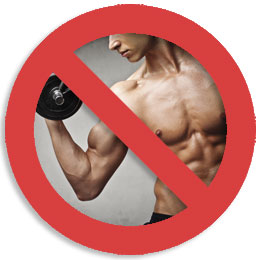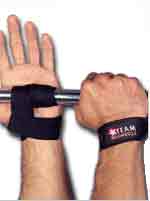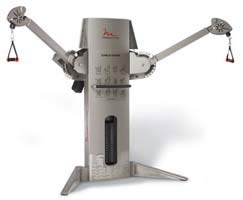- Like
- SHARE
- Digg
- Del
- Tumblr
- VKontakte
- Flattr
- Buffer
- Love This
- Save
- Odnoklassniki
- Meneame
- Blogger
- Amazon
- Yahoo Mail
- Gmail
- AOL
- Newsvine
- HackerNews
- Evernote
- MySpace
- Mail.ru
- Viadeo
- Line
- Comments
- Yummly
- SMS
- Viber
- Telegram
- JOIN
- Skype
- Facebook Messenger
- Kakao
- LiveJournal
- Yammer
- Edgar
- Fintel
- Mix
- Instapaper
- Copy Link
 Building Peaking Biceps
Building Peaking Biceps
Although the biceps muscle is a relatively small muscle group, it makes up a large portion of the front upper arm. It is composed of two different separate heads; the long head and the short head hence the muscle’s name as the word biceps is Latin for “having two parts”. We can consider the biceps the arms’ most glamorous muscle as a nice ripped pair of them can fill your shirt sleeves and impress the women. The latter statement is responsible for the famous slogan we all know very well “curls for the girls”.
Doing curls is great starting place as it is an essential exercise to building your biceps, but if you are looking to isolate and build biceps that have a peak resembling a mountain top, plain old curls, sloppy reps, and bad nutrition just won’t get the job done. Those big impressive biceps are built by consistently executing proper nutrition combined with a solid biceps workout routine.
Men’s Biceps Workout Exercise Tips From the Pro
Building a pair of bulging biceps requires more than just occasionally doing a random biceps workout you found online or in a magazine. As great as those workouts may be, without executing proper form the results of your labor will be short of spectacular. Getting the results you want from your biceps workout requires the muscles to be completely isolated and engaged through proper form, range of motion, adequate nutrition, a well thought out workout routine, and the consistent execution of the aforementioned principals. If you want a peak on your biceps that resembles a mountain top, then it is time to step up your bicep game up through my workout tips.
Swaying/Bad Form
 Bicep exercises are designed to be isolation exercises meaning they should target the biceps muscle alone for optimal growth. However, it is not uncommon to see someone swinging up dumbbells or using poor range of motion while doing bicep curls. Although this allows the individual to use heavier weights, it is because they are using momentum, not stressing the muscle through its entire length, and recruiting more muscle groups than just the biceps.
Bicep exercises are designed to be isolation exercises meaning they should target the biceps muscle alone for optimal growth. However, it is not uncommon to see someone swinging up dumbbells or using poor range of motion while doing bicep curls. Although this allows the individual to use heavier weights, it is because they are using momentum, not stressing the muscle through its entire length, and recruiting more muscle groups than just the biceps.
I am going to refer to this as ego lifting and while this should not come as surprise, ego lifting by hoisting up as much weight as possible during a bicep exercise is not the way to go when it comes to building some serious muscle. Typical ego lifting involves using bad form which reduces the workload on the targeted muscle groups and increases the workload of other muscle groups. During a biceps exercise, ego lifting usually leads to less work being performed by the biceps muscles and more work being performed by anterior or front deltoids which is exactly what you do not want. This is what makes proper form so critical to building some impressive biceps.
Although in some circumstances using more weight and engaging more muscles is a good thing, for isolation related exercises specifically designed to work one muscle group, engaging more muscles is actually counterproductive. Instead, stress just the targeted muscle group or biceps muscle in this case by using proper form and full range of motion. This will allow you to isolate, overload, and stress just the biceps muscle; thus, providing you the proper technique to build your peak.
The Fix
When doing any type of biceps exercise think of the elbow as the pivot point or fulcrum. This point should remain stable while performing a biceps exercise in order to isolate the biceps. If the fulcrum or pivot point moves during a bicep exercise, it engages the anterior deltoids and removes some of the stress from the bicep muscle. In addition to keeping the fulcrum stable, the movement should start with the elbows extended and finish with the biceps touching the forearms. Unless you are performing a workout routine that includes cheat reps like “21’s” half or partial reps have no place when doing curls. Keeping the fulcrum stable and using full range of motion allows all the stress from a curl to be transferred to the muscles of the biceps which is exactly what you want if you are trying to build that peak.
Different Grips/Bars
 If only building a bulging bicep peak was as simple as performing a few sets of a single bicep exercise, then growing a nice pair of arms would be easy. Unfortunately, getting the arms you want will take a lot more work than that. Work such as incorporating different grips to engage the different heads of the biceps, and including different types of weight bars to help overload the heads of the biceps and muscles of the forearm from various angles. For instance, the short head of the bicep tends to be more engaged during exercises with a supinated or palms up grip while hammer curls or other bicep exercises with a neutral grip stress more of the long head of the biceps along with a major forearm muscle the brachioradialis. By incorporating different grips, you can ensure you overload all areas of the biceps muscle.
If only building a bulging bicep peak was as simple as performing a few sets of a single bicep exercise, then growing a nice pair of arms would be easy. Unfortunately, getting the arms you want will take a lot more work than that. Work such as incorporating different grips to engage the different heads of the biceps, and including different types of weight bars to help overload the heads of the biceps and muscles of the forearm from various angles. For instance, the short head of the bicep tends to be more engaged during exercises with a supinated or palms up grip while hammer curls or other bicep exercises with a neutral grip stress more of the long head of the biceps along with a major forearm muscle the brachioradialis. By incorporating different grips, you can ensure you overload all areas of the biceps muscle.
My Personal Favorite Biceps Tool
 When it comes to working the biceps utilizing the cables is one of my favorite tools to overload the muscles. Although barbell curls and dumbbell curls are definitely a staple in my bicep routine, muscle tension is almost non-existent at the top or end of the lift. However, cable machines provide a constant tension through the entire range of motion throughout the exercise. Therefore, giving cable exercises a slight advantage when it comes to stressing the bicep muscles from the beginning to the end of the lift. Including cable exercises in your biceps routine is a sure fire way to contribute to the growth of your biceps peak. However, adequate nutrition is going to be the driving force of muscle recovery and growth so let’s take a look at that next.
When it comes to working the biceps utilizing the cables is one of my favorite tools to overload the muscles. Although barbell curls and dumbbell curls are definitely a staple in my bicep routine, muscle tension is almost non-existent at the top or end of the lift. However, cable machines provide a constant tension through the entire range of motion throughout the exercise. Therefore, giving cable exercises a slight advantage when it comes to stressing the bicep muscles from the beginning to the end of the lift. Including cable exercises in your biceps routine is a sure fire way to contribute to the growth of your biceps peak. However, adequate nutrition is going to be the driving force of muscle recovery and growth so let’s take a look at that next.
Nutrition for Better Results
 Whether you want your arms to look more cut or bigger, adequate nutrition is the most valuable player. Consuming the right amount of calories to get leaner and/or an adequate amount of protein to build and repair muscle should be the primary focus of a nutrition plan for leaner bigger arms. The right caloric and protein requirements required to increase lean muscle varies from person to person. If you are unsure how to find the right calorie intake or protein intake, there are several options such as using an online calculator, hiring a coach, or purchasing my lean physique guide. Remember, the results you reap from your workout program will only take you as far as your nutrition plan.
Whether you want your arms to look more cut or bigger, adequate nutrition is the most valuable player. Consuming the right amount of calories to get leaner and/or an adequate amount of protein to build and repair muscle should be the primary focus of a nutrition plan for leaner bigger arms. The right caloric and protein requirements required to increase lean muscle varies from person to person. If you are unsure how to find the right calorie intake or protein intake, there are several options such as using an online calculator, hiring a coach, or purchasing my lean physique guide. Remember, the results you reap from your workout program will only take you as far as your nutrition plan.
Best Biceps Workout for Men: The Routine
 Because the biceps muscle is a smaller muscle group, they recover quickly and can be trained more frequently than other muscle groups. Therefore, you can complete the following biceps workouts can be up to twice times a week without the risk of overtraining.
Because the biceps muscle is a smaller muscle group, they recover quickly and can be trained more frequently than other muscle groups. Therefore, you can complete the following biceps workouts can be up to twice times a week without the risk of overtraining.
Keep in mind the muscles of the biceps are also engaged synergistically during the majority of back exercises. Because of this overlap, if the biceps are continually trained after the back muscles, they won’t have the benefit of being trained at full strength. Therefore, I suggest periodically training the biceps first or with exercises that won’t cause pre-fatigue due to muscle overlap such as chest, shoulder, and leg exercises.
In addition to faster recovery, smaller muscle groups such as the biceps also require less overall volume to stimulate growth which is why these workouts are limited to four different exercises. Although we want to work the biceps muscle from multiple angles with a variety of grips, doing an excessive amount of exercises to include a multitude of grips and angles may be overkill. The biceps muscle may be able to handle more frequency, but too much at one time may lead to overuse issues or injuries. To side step that issue, we will use two different bicep workouts weekly to include all the exercises we want without the risk of potential overuse injuries or concerns.
Perform each biceps workout once a week on non-consecutive days with at least one workout where the biceps muscles are fresh. For example, a back workout and the first biceps workout on Monday followed by a shoulder workout and the second biceps workout on Thursday.
Biceps Workout Routine #1
- Straight Bar Curls 1 warm up set, 3 working sets of 8-12 reps
- Hercules Curls 3 working sets of 8-12 reps
- Preacher Curls EZ Bar 3 working sets of 8-12 reps
- Hammer Dumbbell Curls 3 working sets of 8-12 reps
Biceps Workout Routine #2
- Concentration Curls 1 warm up set, 3 working sets of 8-12 reps
- Cable Hammer Curls (Rope Attachment) 3 working sets of 8-12 reps
- Incline Dumbbell Curls 3 working sets of 8-12 reps
- EZ Bar Curls 3 working sets of 8-12 reps
The Bottom Line
Building those massive peaking biceps and filling out those t-shirts takes more than just a few bicep exercises. It takes using proper form, hitting the biceps muscles with different grips from various angles, and incorporating the right nutrition plan. Neglect any aspect of the aforementioned tips or fail to implement them consistently, and your biceps peak may end up looking like a small hill instead of a mountain. Grow those biceps, impress the ladies, and fill those shirt sleeves by training your arms with the proper training and nutrition protocols.
About Julian Brown
JulianBrownTraining.com Julian is the co-owner of The Yard Fitness, an established fitness writer, a professional natural bodybuilder, a fitness & sport nutrition specialist, and a certified personal trainer. He began strength training at the young age of fourteen to improve his sports performance and hasn’t looked back since. Julian is a graduate of Grambling State University, ACE & NASM certified, and he has over a decade of personal experience in strength training.

